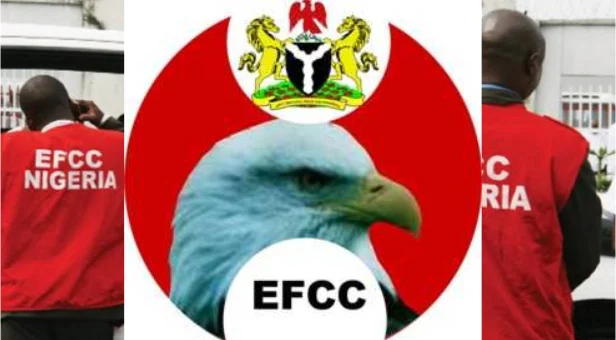The Economic and Financial Crimes Commission (EFCC) has appealed to a Federal High Court in Abuja to dismiss the reliefs sought by Lagos State Governor Babajide Sanwo-Olu in his fundamental rights enforcement suit, calling the governor’s claims “speculative.”
The anti-graft agency made this request in a counter-affidavit submitted before Justice Joyce Abdulmalik, arguing that the governor’s concerns were based on conjecture.
According to the EFCC, Mr Sanwo-Olu’s lawsuit lacks the grounds to file the suit, adding that it is built on hypothetical concerns about his post-office treatment.
Governor Sanwo-Olu, represented by counsel Darlington Ozurumba, filed the suit against the EFCC, alleging that the agency had threatened to investigate, arrest, and prosecute him after his term as governor.
In the summons filed on June 6 and marked FHC/ABJ/CS/773/2024, Sanwo-Olu raised seven legal questions and sought 11 declarations from the court.
Among his requests, Sanwo-Olu sought a judicial declaration affirming his right to privacy as a Nigerian citizen, enshrined under Section 37 of the 1999 Constitution, which he argued should protect him “before, during, and after public office.”
He also requested the court to rule that any EFCC threat to investigate, arrest, or detain him during his governorship was unconstitutional under Sections 35(1) and (4) and 41(1) of the Constitution.
The News Agency of Nigeria reports that the governor petitioned the court to rule that his alleged harassment, threat of arrest, and detention by political opponents at the instigation of the EFCC, based on unsubstantiated and politically motivated corruption allegations, constitutes an abuse of executive powers and public office.
He is seeking an order to prevent the EFCC from harassing, intimidating, arresting, detaining, interrogating, or prosecuting him regarding his tenure as Lagos State governor.
In response, the anti-corruption agency, in a counter-affidavit dated October 30 and filed October 31 by its counsel, Hadiza Afegbua, disputed the governor’s claims.
The EFCC stated that it has neither threatened nor taken any actions that would infringe upon the governor’s rights to freedom of movement, privacy, or personal liberty.
The EFCC’s position was noted on Monday in Abuja.
Ufuoma Ezire, a superintendent and litigation secretary in the EFCC’s Legal and Prosecution Department, submitted the affidavit, asserting familiarity with the case’s details.
Ezire stated, “I have the authority, consent, and permission of the defendant to submit this counter affidavit. I have reviewed the plaintiff’s affidavit supporting the summons and affirm that the statements in paragraphs 4, 5, 6, 7, and 8 are untrue and intended to mislead the court. The claims in paragraph 4 and its subsections are unfounded and unknown to the defendant.”
Ezire clarified that the EFCC is not investigating the governor and has never invited or threatened to arrest him or his staff.
The lawyer further explained that any EFCC interview or interrogation request is issued via written invitation, phone, or text by an officer who identifies themselves with full details.
In the affidavit, Ezire refuted claims of intimidation or harassment, denying any actions that could imply such treatment.
“We are unaware of any allegations of maladministration or fund misappropriation by the governor or any potential threat to his liberty or property rights in this case,” Ezire stated.
Ezire added, “The plaintiff’s assertions are speculative, as there is no petition or intelligence justifying an invitation or threat of arrest by the EFCC at this time. The affidavit is baseless, and the application is in bad faith, aiming to mislead this honorable court.
“In the interest of justice, the reliefs sought by the plaintiff should be denied.”
On October 29, the matter was called for mention. Ozurumba, representing the governor, notified the court of withdrawing an earlier summons, replacing it with a new one.
However, EFCC counsel Hadiza Afegbua noted she had not yet reviewed the latest documents, and Justice Abdulmalik rescheduled the matter for November 26.
It was, however, gathered that while hearing notices have been served for the Nov. 26 proceedings, the suit may be withdrawn by Ozurumba on the next adjourned date.
Meanwhile, in October, Sanwo-Olu denied suing the EFCC over alleged plans to arrest him after the expiration of his tenure in office.
The state government, in a rebuttal signed by Lawal Pedro, SAN, its Attorney General and Commissioner for Justice, also said the governor was not being investigated by the agency.
It said, “Our attention has been drawn to the news circulating in a section of the media, titled: ‘Sanwo-Olu Sues EFCC over alleged plan to arrest, prosecute him after tenure.’
“We need to clarify that Mr. Babajide Sanwo-Olu, at no time, sued or briefed any legal practitioner to file a suit on his behalf concerning the above subject matter.
“Also, it is disingenuous for the Governor who enjoys immunity as conferred on him by the Constitution and has almost three years ahead of him to brief any lawyer on this kind of matter.
“To the best of my knowledge and my inquiry confirmed that the EFCC is not investigating the Governor and has never invited him or threatened arrest of any member of his staff, domestic or otherwise.
“We are currently investigating how the case came to be without our knowledge.”
“We, therefore, enjoin media organisations to be wary of the kind of reports they entertain and publish on their respected platforms in order not to mislead the public,” it added.
Saharareporters






Leave a Reply